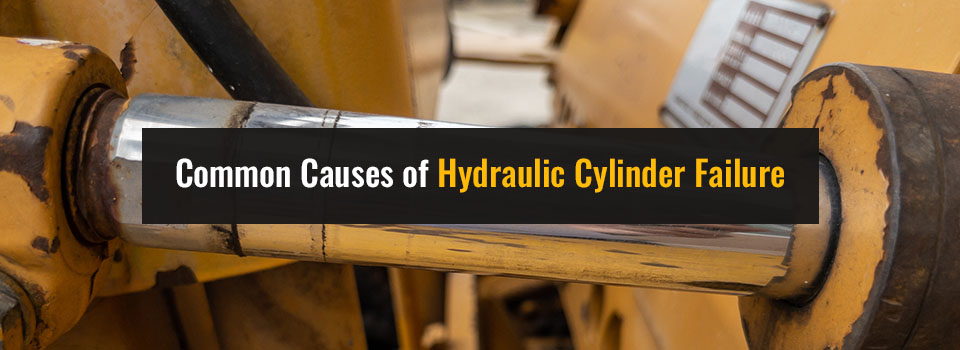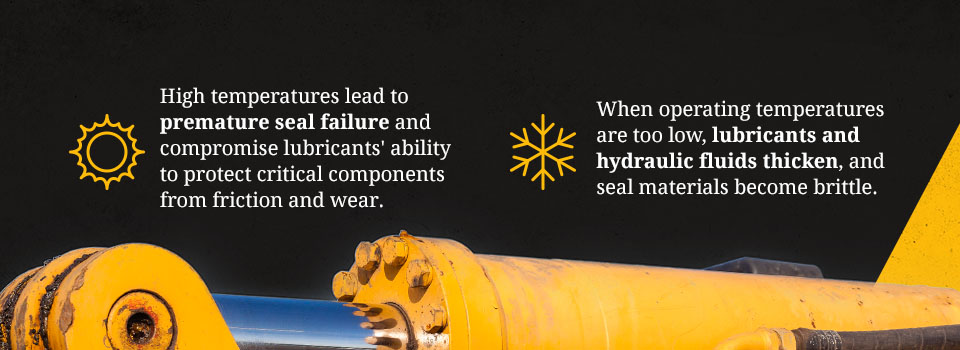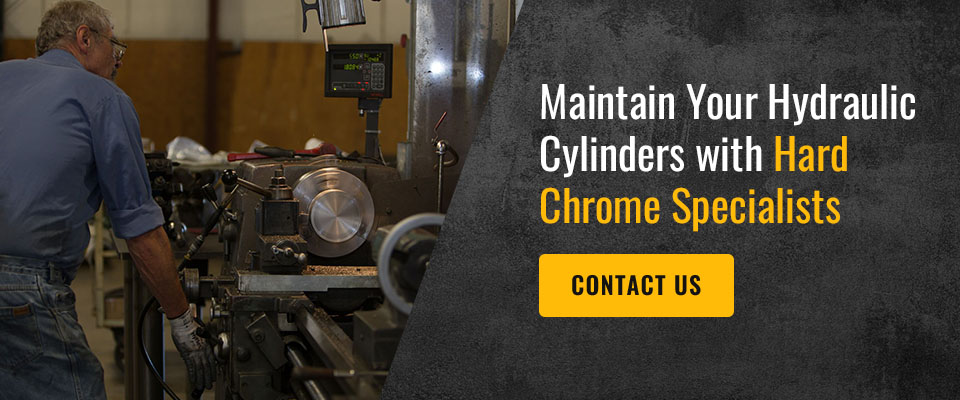Common Causes of Hydraulic Cylinder Failure

Hydraulics have been powering humanity since ancient times. Today, hydraulic cylinders are a critical element of machinery across industries. When they fail, the results vary from inconvenient to catastrophic.
Even with regular maintenance and inspections, many issues can lead to hydraulic system failure. The earlier you identify the source of the problem, the less downtime and additional costs.
Explore the Rest of Our Hydraulic Systems Guide:
10 Hydraulic Cylinder Failure Causes
Hydraulic cylinder faults impact the safety and functioning of your whole hydraulic system. When a hydraulic cylinder fails, issues like internal leakage and increased friction between components can increase the chance of injury, health problems, fires and environmental contamination. It’s essential to know why your hydraulic cylinder is not working so you can handle the source of the issue before it becomes a severe risk.
Some common hydraulic cylinder problems to be aware of include:
1. Seal Leakage
When a hydraulic cylinder is not working, one of the first issues to look for is seal leakage. Seals are critical in hydraulic cylinders, containing the pressurized hydraulic fluid and protecting various components from leakage. They are also most susceptible to damage. When seals leak, it reduces the cylinder’s ability to maintain operating pressure, diminishing performance until the point of total failure. Various things can cause seal leakage, from excessive heat to incorrect fitting and corrosion.
2. Fluid Contamination
Contamination causes 70% of hydraulic system failures, causing severe damage to the piston rod or seal surface. Fluid contamination can be through air, water or foreign particles. Air or water contamination impacts cylinder performance, decreasing stroke power. Foreign, abrasive particles trapped in the fluid scratch the cylinder interior, destroying the rod finish, blocking ports and damaging fittings. Faulty wiper seals are the most common cause of fluid contamination.
3. Corrosion
Moisture inside a hydraulic cylinder can cause corrosion within the barrel. Due to its location, this issue is often challenging to fix, requiring the replacement of the affected parts. Corrosion can also occur when you store your equipment outdoors with extended rods. Over time, the rods will rust while out, destroying the cylinder seal the next time you retract it. In the long term, corrosion can lead to complete system failure.
4. Mounted Connection Failure
Depending on your project, you can mount a cylinder in various ways. When you overload or misalign the cylinder, the mounted connection is under excessive stress, resulting in accelerated wear and eventual failure.
5. Over-Pressurizing
High pressure is one of the most frequent causes of cylinder failure. Precise, controlled pressure is crucial for hydraulic cylinder function. Pressure outside manufacturer recommendations can lead to cylinder damage and unsafe working conditions. Over-pressurizing causes swelling and malformation, impacting overall system integrity and safety.
6. Side Loading
Hydraulic cylinders provide a linear force to move a load. Side loading occurs if an external force is applied perpendicular to the intended alignment. At a moderate level, this issue causes uneven wear. Extreme side loading can result in dangerous and costly problems like bent or broken rods.
7. Extreme Temperatures

Excessive temperatures are a significant cause of cylinder failure. High temperatures lead to premature seal failure and compromise lubricants’ ability to protect critical components from friction and wear. When operating temperatures are too low, lubricants and hydraulic fluids thicken, and seal materials become brittle.
8. Rod Bearing or Piston Rod Damage
Piston rods fail the most often of all hydraulic components. Improper alignment between the cylinder and load is the primary cause of damaged rod bearings. Pushing the cylinder beyond the specified load is another, resulting in bending or side loading. Over time, piston damage causes complete cylinder failure.
9. Broken Eye Bearings
Two main circumstances cause failed eye bearings — loading the cylinder above its specifications and subjecting it to a sudden impact or shock loading.
10. Chemical Attack
When environmental chemicals come into contact with the cylinder seal, it can corrode, causing the cylinder to fail.
Hydraulic Cylinder Failure Symptoms
Hydraulic cylinder failure can be costly in terms of repairs, replacements and downtime. Identify the issue sooner, and you can minimize the damage to your overall system. A full cylinder breakdown is straightforward to identify, but you can prevent it from happening if you pay attention to the warning signs. Some common signs of impending hydraulic cylinder failure include:
- Banging, knocking and unusual sounds: Listen for noises different from the usual hydraulic cylinder sounds. It might indicate a cylinder fault. Banging or knocking sounds could be signs of cavitation or aeration problems, which create unusual pressure differentials inside the cylinder.
- Unusual movements: Hydraulic cylinders should move fluidly. Any shuddering or jolting movements indicate that the piston or rod cannot move as it should. These movements often occur due to friction in your system. Check your components for wear and damage, and ensure the cylinder has enough lubrication.
- Excess heat: All hydraulic cylinders have a set temperature range. If a cylinder starts to heat up beyond a certain point, getting hotter than usual, it’s likely a sign of a bigger problem. Jolting movements can cause heat due to underlying friction, but excess heat can also be a standalone issue.
- Loss of speed or power: Faulty cylinders often lose power, appearing to work slower than usual. If you notice machine cycles take longer than they should, it could mean a low flow or leak that affects internal pressure.
- Increased power consumption: A faulty cylinder must work harder to complete the same tasks, which means the machine needs energy. Friction and leaks can cause this issue, forcing the cylinder to pump more fluid to compensate.
How to Prevent Hydraulic Cylinder Failure
A proactive approach to avoiding failure can save you money on downtime and hydraulic cylinder repair. Preventive maintenance is the most common strategy, with 88% of manufacturing organizations following a preventive maintenance strategy. Catching minor issues or preventing them before they become significant problems is the most cost-effective way to limit equipment failure damage.
While you can only prevent failure sometimes, the following tips can help you reduce the risk of everyday issues turning into complete failures:
- Maintain your seals: Fluid leaks occur if the seals are cracked or worn. Avoid seal leakage with routine visual inspections, checking for cracking, hardening and general wear. Replace any underperforming seals immediately.
- Monitor pressure levels: Your hydraulic system creates pressure to perform the desired tasks. Consider installing a pressure gauge to monitor pressure variations. If you notice any significant differences, shut your system down and identify the source of the problem.
- Avoid fluid contamination: Flush your hydraulic system before adding new fluid, and store your liquid reserves in airtight containers to prevent breathing.
- Use the correct materials: Inappropriate components contribute to many hydraulic cylinder failures. Ensure your rods are the correct diameter and have the proper finish for the job, invest in high-quality seals, and check manufacturer ratings on all components.
- Inspect your rods: Use a dial gauge regularly to assess rod straightness and use a press to repair any bent or damaged rods.
- Manage your operating environment: Keep your environment clean of corrosive chemicals, monitor the temperature to boost cylinder longevity, and shield the moving parts from harsh environments during storage and operation.
- Clean your equipment: Keep your equipment and the surrounding environment clean to prevent debris and foreign particles from entering the cylinder.

Maintain Your Hydraulic Cylinders with Hard Chrome Specialists
Hydraulic cylinders fail for various reasons, and regular preventive maintenance is the secret to boosting their longevity. Routine inspections are essential to ensure your system works safely and effectively. If you find an issue, schedule a hydraulic cylinder repair with experts from Hard Chrome Specialists as soon as possible.
Since 1988, Hard Chrome Specialists has provided efficient and quality services. Our factory-trained technicians and management team have over 75 combined years of experience, offering skilled hydraulic repair with minimal downtime when you need it most. Contact us today to learn more about our hydraulic repair services.
